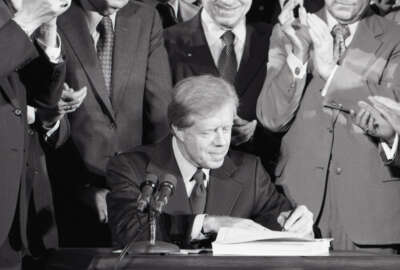
Retirement plan surprise coming soon?
Many feds have been watching the progress of "retirement reform" bills each year and making plans to retire, if they could, before their effective date, if that was...
Many if not most federal and postal workers, and retirees are horrified by proposals to “reform” their primary retirement plans. Over the past few years Congress and the White House have proposed or suggested changes that would make Federal Employees Retirement System employees pay more for their benefits while working, then lose all inflation protection on their annuities once retired.
Civil Service Retirement System retirees would continue to get cost-of-living adjustments, but they would be 0.5 percent less than the actual increase in the annual cost-of-living. There has been talk of changing the so-called High 3 formula so that annuities would be based on length of service and their highest five-year average salary. And there have been proposals to set up a voucher system for the Federal Employees Health Benefits Program to “encourage” workers and retirees to shop for lower-premium plans.
Uncle Sam currently pays about 70 percent of the total premium for most workers and retirees.
The idea of a new retirement plan limited to Social Security and employee-government contributions to the Thrift Savings Plan, is also being considered.
For many people who fear any changes, the assumption has been that the changes, when and if made, would be immediate and cover everybody in government or on the retirement roles. Many feds have been watching the progress of “retirement reform” bills each year and making plans to retire, if they could, before their effective date, if that was possible.
But what if some, most or all of the proposed changes — likely to be outlined in full in October by the Office of Personnel Management, Office of Management and Budget and the White House — are prospective? What if current workers and retirees are grandfathered in? That is, they continue under the current rules while the new system would be for new hires and new retirees.
Earlier this year, OPM Director Jeff Pon told Federal New Radio’s Nicole Ogrysko that various administrations “have been nibbling around the edges of civil service reform” for decades, with the only significant action taken 40 years ago by the Carter administration. He said a remake, that will last another four to five decades, is in order and on its way. It will likely cover a new overall pay system, plus pay programs tailored to specific agencies and occupations.
Some reforms will require congressional approval, while others can be done by executive order or by using agency-specific authority or directives from OPM. A source who has known Pon for years said “Jeff is a pro. He’s very good at this and knows how to get things done.” Making the most significant changes prospective to cover future hires, rather than immediate, “would make them much easier to get through Congress,” he said.
The odds of getting any significant changes in pay, pensions or other benefits approved by Congress this year are slim. The midterm elections are obviously a major distraction as is the Mueller investigation, which exploded this week with the promise of much more to come.
But it would certainly be easier to get some of them enacted into law this year or in 2019, if they are not applied to any of the 5-million-plus active and retired feds who like their retirement package just the way it is. And applying them only to new hires and new retirees would weaken, if not eliminate, any breach-of-contract legal argument opponents of the changes would otherwise make in court.
Nearly Useless Factoid
By Amelia Brust
Every year, the Miss Camel Beauty Contest is held during the Al Dhafra Festival in the United Arab Emirates. Prizes are given for most beautiful camel, the fastest and “milkiest.” The word “camel” is in fact related to the Arabic word “jamaal” or “jamal,” which means beauty.
Sources: VICE and University of Pennsylvania
Copyright © 2024 Federal News Network. All rights reserved. This website is not intended for users located within the European Economic Area.
Mike Causey is senior correspondent for Federal News Network and writes his daily Federal Report column on federal employees’ pay, benefits and retirement.
Follow @mcauseyWFED





